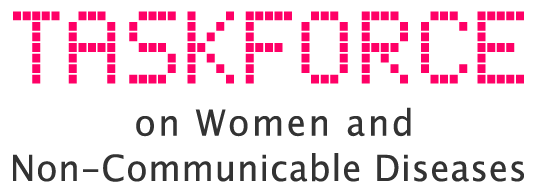The George Institute for Global Health, India is delighted to announce that it has been appointed Secretariat of the Taskforce on Women and Non-Communicable Diseases (NCDs). To mark this exciting chapter, a new Taskforce website launches today.
Founded in 2011, the Taskforce on Women and NCDs has been addressing the growing burden of NCDs on women by providing a platform for collaboration and engagement while developing relevant resources and advocacy positions. It brings together leading global health organisations from the women’s health and NCD communities to improve women’s health by expanding programs to meet women’s needs across the lifecycle.
“The Taskforce invites organisations with a vested interested in addressing NCDs in women to join us. Our collective efforts serve to make us stronger and help advance the SDGs and making women a central driver.”
– Diana Vaca McGhie, Global Advocacy Director at the American Heart Association, and Co-Chair of the Taskforce
A number of emerging health challenges are transforming the landscape of women’s health needs across low- and middle-income countries (LMICs). Changing demographics, lifestyles, globalisation, and urbanisation are contributing to the rapid rise in NCDs such as cardiovascular disease, cancer, diabetes, and chronic respiratory disease.
“Global efforts to improve the health of women and girls, in the last few decades have largely focused on reducing maternal mortality and morbidity, while in recent years, non-communicable diseases (NCDs) in women have emerged as major global health challenge that hinders their human right to live healthily and reach their highest economic and social potential. I am delighted that through our hosting of the Secretariat of this Taskforce, we have an opportunity to play a central role in co-ordinating actions to reduce the impact of NCDs on women.”
– Robyn Norton, co-founder & Principal Director of The George Institute for Global Health
Globally, these changes have adversely affected all women, but those living in LMICs are at a greater risk owing to compounding socio-economic inequity: NCDs are estimated to account for the majority of all female deaths in these regions due to persistent social, gender and economic inequalities as well as general pervasive inequalities in access to health information, appropriate care, and life-saving technologies.
“Two of every three deaths among women worldwide are caused by non-communicable diseases (NCDs) – principally heart disease, stroke, cancer, diabetes and chronic respiratory diseases. Unfortunately, the global health agenda has largely overlooked both the burden of NCDs among girls and women and the unique risks and challenges they face in accessing appropriate healthcare. The Taskforce on Women and NCDs seeks to challenge this bias and advocate for better integration of women and their needs in NCD policies and programmes around the world.
– Kelcey Armstrong -Walenczak, Policy and Advocacy Manager at the World Heart. Federation and Co-Chair of the Taskforce
The Secretariat will act as the focal point of the Taskforce and help coordinate the activities undertaken by members to promote education, advocacy, evidence-based policy, and interventions that protect women’s health and well-being.
“We at The George Institute for Global Health are honoured to serve as the Taskforce Secretariat and look forward to supporting and contributing to this collaborative effort to address the unique burden of non-communicable diseases on women. The objectives of this Taskforce are aligned perfectly with The George Institute’s Global Women’s Health Program, which focuses on the health and well-being of women throughout their lives.”
– Professor Vivekanand Jha, Executive Director, The George Institute for Global Health, India
This piece was originally published on George Institute for Global health




